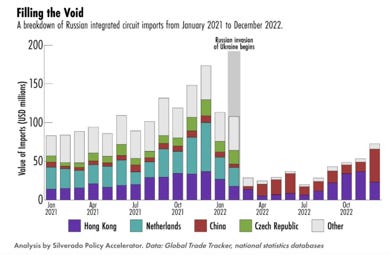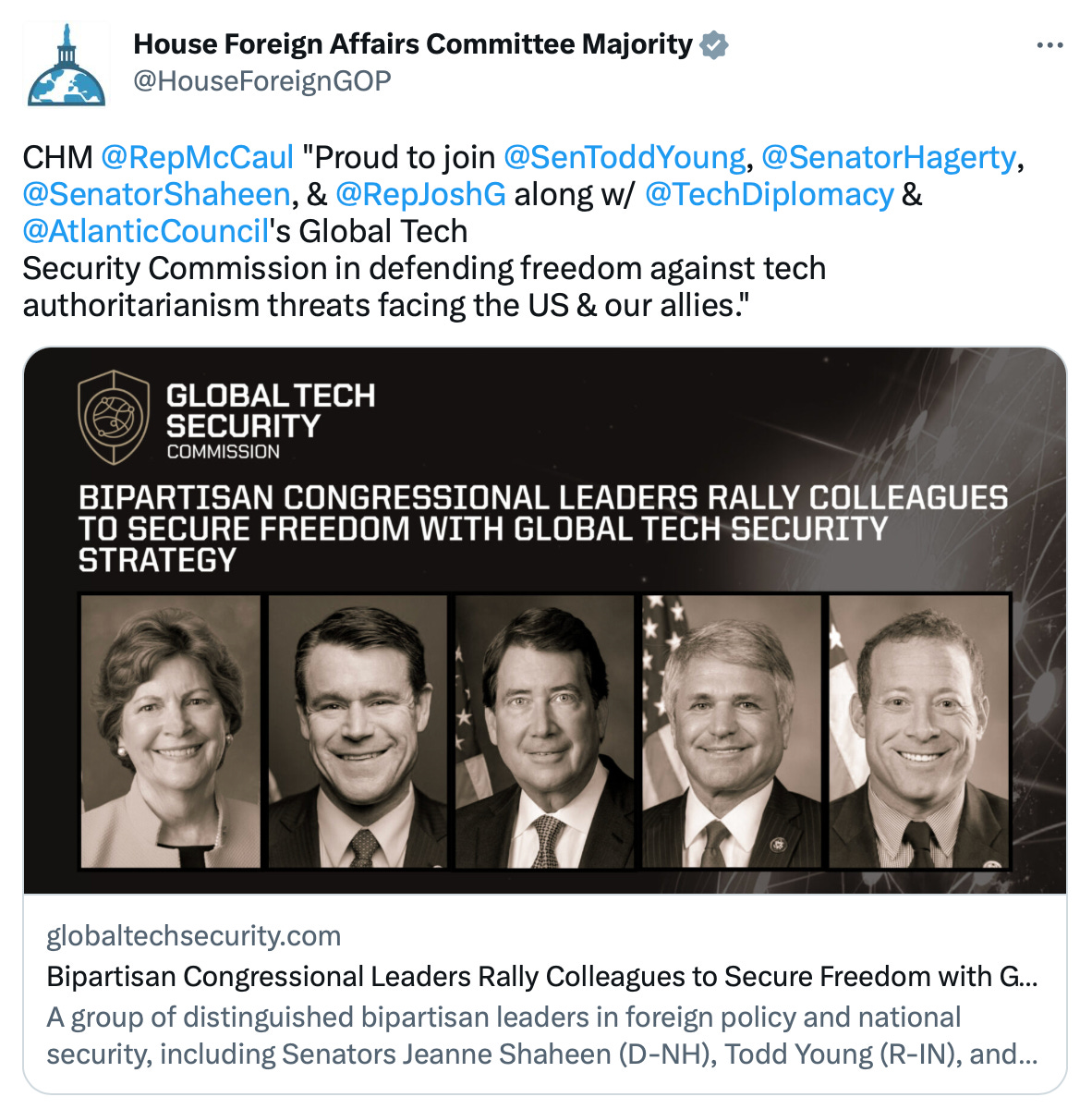Tech Diplomacy Now: Issue 4, 2023
The intersection of technology, foreign policy, and the news you need to know
Welcome to Tech Diplomacy Now, a publication of the Krach Institute for Tech Diplomacy at Purdue, providing you with critical information and global news on the intersection of emerging technologies, foreign policy, and national security.
TABLE OF CONTENTS
Top News of the Week
Announcements
Latest News
Technology Strategy and Policy
Artificial Intelligence
Telecommunications Networks and Infrastructure
Critical Minerals
Semiconductors and Microelectronics
Energy and Climate
Opinion and Commentary
The Last Word
Top News of the Week – Beijing’s direct military assistance to Moscow
As Putin’s war on Ukraine drags into its second year, much of the foreign policy and tech diplomacy debate centers on deterring China from providing direct military support to Russia.
In an update last week titled Open Secrets, C4ADS concludes:
“Reliable aggregated global trade records indicate that the People’s Republic of China’s (PRC’s) state-owned defense company Poly Technologies, Inc. (保利科技有限公司) has neither stopped nor decreased its trade in sensitive technologies with Russian state defense companies since the start of Russia’s war against Ukraine and the imposition of broader Western sanctions against Russia. In fact, global trade records indicate an increase in Poly Technologies’ total exports to Russia after the start of the invasion—including in parts explicitly labeled for use in Russia’s Mi-system helicopters.”
These military components are in addition to the semiconductors that the PRC supplies to Russia, which can no longer be sourced from the countries that have imposed sanctions and export restrictions.
Challenge for Tech Diplomats – Detecting and analyzing complex supply chains and commercial relationships requires new skills, intelligence collection methods, and analytical tools, which are only now being understood. Particularly when the parties to these transactions seek to obscure their activities and deny access to financial and other data. Expecting that the PRC and Russia will openly admit their strengthening technology and defense trade ties is unrealistic.
Under Secretary of Commerce Alan Estevez made these points a few months ago during the roll-out of a CSIS report on Improving Export Controls Enforcement Using Data Science and Artificial Intelligence.
In his testimony to the Senate Banking Committee in February, Kevin Wolf, a former Assistant Secretary of Commerce for Export Administration made a number of recommendations that should animate those seeking to better employ the tools of tech diplomacy.
Adapt and modernize the post-Cold War multilateral export control regimes to fucus on issues involving China and Russia.
Develop, with partners, better data collection and analysis methods with a focus on global distributor and re-seller networks.
Simplify defense and dual-use trade rules for allies.
As competition in the technology domain becomes more aggressive, the United States and its partners will need to develop the Tech Diplomacy tradecraft and competitive mechanisms to succeed.
____________
Announcements
On Tuesday, a bipartisan group of lawmakers released a letter calling on their colleagues to support and engage with the Global Tech Security Commission as it seeks to advance liberty and prosperity across allied democracies, educate Congress and the public about the course of the U.S.-China strategic competition, promote a high-tech, innovation-driven job market, and evaluate technologies on whether they uphold liberal democratic values or enable techno-authoritarianism.
Senators Jeanne Shaheen (D-NH), Todd Young (R-IN), and Bill Hagerty (R-TN), along with Representatives Michael McCaul (R-TX) and Josh Gottheimer (D-NJ) serve as honorary Co-Chairs of the Global Tech Security Commission which brings together private and public sector leaders from across democracies to effectively compete with China across emerging technology industries.
Latest News
A Plan to Ban TikTok in Montana Is a Preview for the Rest of the Country - New York Times, April 12, 2023
“'[Keith Krach] testified that he wouldn’t let his 11-year-old twins near the app. He said it was “disguised as candy, but it’s really cocaine.'”
China’s New Tech Weapon: Dragging Its Feet on Global Merger Approvals – WSJ, April 4, 2023
US Says Tough China Moves Needed to Counter ‘National Champions’ – Bloomberg, April 3, 2023
The Biden administration is pushing back against Chinese assertions that the US is containing the rise of the world’s second-biggest economy, with a senior diplomat saying more assertive economic measures were necessary to produce “a level playing field.”
In China, “you have ‘national champions’ who get special deals, enterprises that don’t pay rent — get cheap financing, don’t pay taxes, get all sorts of benefits because the Chinese government has decided that they will be the flagships for their industrial policy,” Jose Fernandez, undersecretary of state for economic growth and energy, said in an interview.
Technology Strategy and Policy
Much ink has been split about ‘decoupling’ with arguments raging on both sides that doing so is either necessary or impossible/disastrous. Regardless of the arguments, it would seem that a degree of separation is taking place already.
Made-in-India iPhones surge as Apple moves production away from China – SCMP, April 5, 2023
Apple’s Complex, Secretive Gamble to Move Beyond China – Bloomberg, April 5, 2023
The company is laying the foundation to make phones elsewhere, from the screws on up.
US-China tech war: without advanced chips, can China’s smartphone industry survive? – SCMP, April 4, 2023
Limited access to high-end semiconductor chips poses a major threat to China’s world-leading smartphone manufacturing industry. Chinese smartphone firms will face an ‘innovate or die’ situation, especially as multinationals look to diversify, industry insiders say.
Silicon Valley Is Beating Washington to China Decoupling – Foreign Policy, April 3, 2023
Tech investors in the United States and China were dialing back bilateral links years before Biden decided to.
After flocking to China for more than a decade, American venture capitalists have significantly curtailed their exposure to the country’s technology sector in recent years, in large part due to increasing geopolitical tensions and increasing investment restrictions in both Washington and Beijing.
According to data from research firm PitchBook, U.S. investors participated in deals worth $7.2 billion in China’s tech industry last year, down from its recent peak of $35.6 billion in 2018. The number of deals also fell to its lowest level in five years. Market intelligence firm S&P Global, which published similar figures, blamed a cocktail of China’s strict zero-COVID policy, the resulting supply chain issues, and escalating tensions between Beijing and Washington “causing some investors to proceed with caution.”
Apple at Heart of US-China Selective Decoupling, Gallagher Says – Bloomberg, April 8, 2023
Artificial Intelligence
For those interested in the rapidly changing landscape of artificial intelligence, read the first piece below from Stanford’s center on Human-Centered Artificial Intelligence. A baseline understanding of the issues is more critical now than ever.
2023 AI Index Report – Stanford University Human-Centered Artificial Intelligence, April 2023
Former Google CEO Rejects AI Research Pause Over China Fears – Bloomberg, April 6, 2023
Putting a temporary pause on artificial intelligence development would only hand an advantage to competitors in China, former Google CEO Eric Schmidt said, after more than 1,000 researchers signed a letter warning of the consequences of moving too quickly on AI research.
Speaking to the Australian Financial Review in an interview published Friday, Schmidt said there were legitimate concerns about the speed of research into AI but they should be mitigated by tech companies working together to set standards.
Building R2-D2 – War on the Rocks, March 29, 2023
10 Graphs That Sum Up the State of AI in 2023 – IEEE Spectrum, April 8, 2023
Telecommunications Networks and Infrastructure
Global infrastructure for telecommunications is deeply contested, but a pattern is starting to form: the world is bifurcating into at least two telecommunications ecosystems. That will have important implications for researchers, industries, and policy-makers.
TikTok’s Russia Challenge: Kremlin-Funded Media Reaches Millions on the App – Alliance for Securing Democracy, March 30, 2023
Chinese State Propaganda Goes to Bat for TikTok – Alliance for Securing Democracy, April 6, 2023
During the week of the [TikTok CEO] hearing, we tracked Chinese state media and diplomatic activity on the Alliance for Securing Democracy at GMF’s Hamilton 2.0 dashboard. We found that Chinese diplomats and state media have mounted a sizable influence campaign in defense of TikTok, during which they have recycled familiar tropes and anti-US narratives in an effort to shape public opinion beyond China’s borders. These narrative efforts have generally followed five key trends.
Chinese diplomatic and state media accounts:
Amplified the TikTok CEO’s statements to paint the app in a benign light;
Hyped TikTok’s popularity and elevated the consequences of a ban;
Criticized and mocked members of Congress;
Denigrated the entire US political system and painted the United States as hostile to business; and
Portrayed criticism of TikTok or China as xenophobic.
China’s military aims to launch 13,000 satellites to rival Elon Musk’s Starlink – WaPo, April 6, 2023
In the race for low-earth orbit dominance, Beijing is years behind SpaceX and worried about the threat to its national security.
China plans $500 million subsea internet cable to rival US-backed project – Reuters, April 6, 2023
Chinese state-owned telecom firms are developing a $500 million undersea fiber-optic internet cable network that would link Asia, the Middle East and Europe to rival a similar U.S.-backed project, four people involved in the deal told Reuters. The plan is a sign that an intensifying tech war between Beijing and Washington risks tearing the fabric of the internet.
Critical Minerals
China weighs export ban for rare-earth magnet tech – Nikkei Asia, April 6, 2023
China is considering prohibiting exports of certain rare-earth magnet technology in a move that would counter the U.S.'s advantage in the high-tech arena.
Officials are planning amendments to a technology export restriction list, which was last updated in 2020.
Indonesia to propose limited free trade deal with US on critical minerals – Reuters, April 10, 2023
Semiconductors and Microelectronics
It appears that Washington’s efforts to deny Beijing the most advanced semiconductors, as well as the tools to produce them, will be successful and have important implications in the wider technology competition. What is less clear are the implications of Beijing’s efforts to massively expand mature node semiconductor manufacturing capacity and what that will mean for an industry dependent on revenue from mature node chips to fund innovation in advanced chips.
Running on Ice: China’s Chipmakers in a Post-October 7 World – Rhodium Group, April 4, 2023
This note takes a closer look at which semiconductor segments still lie beyond the reach of US regulators and where Chinese chipmakers and state backers may focus their resources. We also assess how China’s expanding market share in these mature technology segments could trigger regulatory actions by the US aimed at steering supply chains away from China.
Key Takeaways
US fabless chip designers depend almost entirely on foreign foundries for contract-manufacturing of legacy chips: 80% of foundry capacity for 20-45nm process nodes is located in China and Taiwan. For 50-180nm process nodes, China and Taiwan together control around 70% of foundry capacity globally.
An attempt by the US and partners to outpace China in building out manufacturing capacity for trailing edge process nodes would require considerable time and resources, as well as political tolerance of higher prices. In the next 3-5 years China is due to add nearly as much new 50-180nm wafer capacity as the entire rest of the world.
China’s tech indigenization efforts, the threat of US export controls, and OEM supply chain diversification could help Chinese chipmakers grow market share in segments that do not rely on node shrinkage, such as microcontrollers and automotive semiconductors.
Chinese firms designing cutting-edge semiconductors for markets like smartphone processors and autonomous driving are still producing well below the high performance computing thresholds set by US export controls, but will remain heavily dependent on foreign-owned foundries to manufacture such chips.
The U.S.-China chip race heats up – GIS, April 6, 2023
Micron Gets Caught in U.S.-China Crossfire – WSJ, April 3, 2023
China Strikes Back at U.S. Chip Maker Even as It Signals Openness – NYTs, April 4, 2023
Japan restricts chipmaking equipment exports as it aligns with US China curbs – Reuters, March 31, 2023
China seeks WTO review of chip export restrictions led by US – SCMP, April 5, 2023
US, Japanese, and Dutch semiconductor equipment export values to China dropped; more substantial strategies demanded by expert – DigiTimes, April 7, 2023
Owing to the US-coordinated chip sanctions on China, the US, Japan, and the Netherlands have seen a significant drop in the total export value of semiconductor equipment to China.
Official Chinese estimations have also reflected a drop. As reported by Nikkei, citing a senior official in the Japanese semiconductor industry, Japan's export value of semiconductor equipment to China has seen an annual decrease of 16% in fourth-quarter 2022, while the US and the Netherlands have respectively seen an annual decrease of 50% and 44% in the same period. In contrast, exports of semiconductor equipment to countries other than China have increased, with Japan and the US seeing a 26% and 10% growth, respectively.
Why Taiwan’s tech sector is beyond Beijing’s reach - Jon Pelson, The Hill, April 14, 2023
As important as it is for the world to protect the chip-making facilities in Taiwan, this is not an asset that can be conquered and acquired. It could only be destroyed
Energy and Climate
The US is greening itself toward more dependence on China – The Spectator, April 7, 2023
Elon Musk Says Tesla Will Build Shanghai Battery Factory – NYTs, April 10, 2023
Opinion and Commentary
U.S. Research Scientists Are Blind to China’s Threat – Paul Dabbar, WSJ, April 3, 2023
All government research agencies have different cultures. U.S. public-health agencies have historically been rooted in “open science”—the view that scientific collaborations should be encouraged globally, and that geopolitics shouldn’t constrain cooperation between well-meaning researchers. Little thought is typically given to the national-security implications of joint research. Even when confronted with credible information about the risks of their research partnerships, the public-health agencies often ignore them. Some in the open-science agencies refuse even to acknowledge that research can have national-security implications. But the issue can’t be wished away.
Like it or Not, the US Faces a Russia-China Axis – Chels Michta, CEPA, March 31, 2023
Counter Chinese Bullying With an ‘Economic Article 5’ – Anders Fogh Rasmussen, Foreign Policy, March 28, 2023
The U.S. Needs an Economic War Council for China – Edward Fishman, Foreign policy, April 6, 2023
Using lessons from the template it developed in advance of Russia’s 2022 invasion of Ukraine, Washington should rapidly start preparing to use economic statecraft to defend its allies in the Indo-Pacific from Chinese aggression.
U.S. allies are on board for China chip tech controls after all – Chris Miller, Nikkei Asia, April 4, 2023
Sharing of costs has reduced corporate grumbling about lost exports.
The Last Word
“You can’t practice East Asian diplomacy without tech diplomacy, you can’t do human rights work without tech, you can’t do climate diplomacy without tech.” - Ambassador at Large for Cyberspace and Digital Policy, Nathaniel Fick
State Dept cyber bureau plans to add tech experts to every embassy by next year - Federal News Network, April 12, 2023
____________
About: Tech Diplomacy Now
Technology is the crossroads and main battlefield of the four-dimensional diplomatic, economic, cultural and military contest between freedom and authoritarianism. Technology is either grounded in trusted democratic principles—respect for the rule of law, human rights, property, transparency, sovereignty and the environment—in order to advance freedom, or it is weaponized by authoritarian regimes and malign actors in order to control and oppress.
We believe technology must advance freedom.
The nonpartisan Krach Institute for Tech Diplomacy at Purdue aims to secure freedom from techno-authoritarian threats by accelerating the widespread adoption of trusted tech. The Institute is the preeminent global authority on Tech Diplomacy, integrating tech expertise, Silicon Valley strategies, and foreign policy tools to build the Global Tech Trust Network of governments, companies and individuals united around a set of shared trust principles and a common mission to ensure that technology advances freedom
We hope you find Tech Diplomacy Now a valuable resource on the emerging critical issue of technological diplomacy and its impact on our way of life.






